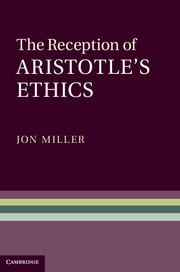Book contents
- The Reception of Aristotle's Ethics
- Contents
- Notes on contributors
- Acknowledgments
- A note on abbreviations and transliteration
- Introduction
- Chapter 1 The Nicomachean Ethics in Hellenistic philosophy
- Chapter 2 The transformation of Aristotle's ethics in Roman philosophy
- Chapter 3 Aristotelian ethics in Plotinus
- Chapter 4 St. Augustine's appropriation and transformation of Aristotelian eudaimonia
- Chapter 5 The Arabic and Islamic reception of the Nicomachean Ethics
- Chapter 6 Maimonides’ appropriation of Aristotle's ethics
- Chapter 7 The relation of prudence and synderesis to happiness in the medieval commentaries on Aristotle's ethics
- Chapter 8 Using Seneca to read Aristotle
- Chapter 9 Aristotle's Ethics in the Renaissance
- Chapter 10 The end of ends? Aristotelian themes in early modern ethics
- Chapter 11 Affective conflict and virtue
- Chapter 12 Kant and Aristotle on ethics
- Chapter 13 The fall and rise of Aristotelian ethics in Anglo-American moral philosophy
- Bibliography
- Index
Chapter 1 - The Nicomachean Ethics in Hellenistic philosophy
A hidden treasure?
Published online by Cambridge University Press: 05 February 2013
- The Reception of Aristotle's Ethics
- Contents
- Notes on contributors
- Acknowledgments
- A note on abbreviations and transliteration
- Introduction
- Chapter 1 The Nicomachean Ethics in Hellenistic philosophy
- Chapter 2 The transformation of Aristotle's ethics in Roman philosophy
- Chapter 3 Aristotelian ethics in Plotinus
- Chapter 4 St. Augustine's appropriation and transformation of Aristotelian eudaimonia
- Chapter 5 The Arabic and Islamic reception of the Nicomachean Ethics
- Chapter 6 Maimonides’ appropriation of Aristotle's ethics
- Chapter 7 The relation of prudence and synderesis to happiness in the medieval commentaries on Aristotle's ethics
- Chapter 8 Using Seneca to read Aristotle
- Chapter 9 Aristotle's Ethics in the Renaissance
- Chapter 10 The end of ends? Aristotelian themes in early modern ethics
- Chapter 11 Affective conflict and virtue
- Chapter 12 Kant and Aristotle on ethics
- Chapter 13 The fall and rise of Aristotelian ethics in Anglo-American moral philosophy
- Bibliography
- Index
Summary
- Type
- Chapter
- Information
- The Reception of Aristotle's Ethics , pp. 5 - 30Publisher: Cambridge University PressPrint publication year: 2012
- 4
- Cited by



